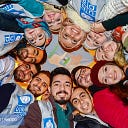Fadfada: A much needed space for mental health support in Syria
“I was in a very dark place. It felt like a cancer was eating up my mind and soul. I was dying slowly from the inside, each day more. I hit rock bottom, but my family depends on me and giving up was not an option. I was devastated and suffering in silence” Says the 25 year-old woman from Hama
More than a decade of war has had profound consequences on peoples’ physical and mental well-being, and resilience in Syria.
The World Health Organization estimates that in areas affected by conflict, one person in five is living with some form of mental disorder, from mild depression or anxiety to psychosis. Worse, almost 1 in 10 is living with a moderate or severe mental disorder.
Exposure to armed conflict, forced displacement, sharp decline of the economy and associated hardships such as poverty, unemployment, and social isolation substantially increase vulnerability to psychosocial distress, and prevalence of mental disorders. With more than 90 percent of the population living below the poverty line, few Syrians have been spared from the direct and indirect impacts of what constitutes one of the largest displacement crises in the world and millions are still dependent on humanitarian assistance for their survival*.
“I had an uncontrollable urge to cry. I cried profusely and I felt relived. For the first time in years, I was able to let go” shared Mira, 21 year-old woman from Aleppo with her therapist online. “The first drawing is from when I was depressed and anxious. The second drawing is from 2 days ago. I am starting to love myself again” she added.
Since its launch in August 2020, the online Psychosocial support platform: Fadfada, responded to more than 10,300 cases from across Syria. Supported by the United Nations Development Programme (UNDP) in cooperation with the World Health Organization (WHO), the platform provides confidential support through a network of 15 specialists, including psychiatrists, psychologists, sociologists, speech therapists, and family councillors who are available around the clock, six days a week across the country including hard to reach areas, such as Idleb and Raqqa.
Individuals can reach out anonymously, leave a short description of the issues they are facing and indicate a preferred time and means of contact. Cases are then prioritized depending on nature and severity, and a specialist is assigned to contact and follow up on the case, free of charge.
“I had a strong stutter that got worse in the past few years. It prevented me from interacting with the outside world. I stopped doing my hobbies, fell behind in school and went into a deep depression” said Amer, 27 year-old university student from Rural-Damascus. “Now I am about to graduate and considering pursuing higher education. I am back to playing sports and even took on reading as a new hobby. Most people can’t even notice I have a speech problem” he added.
“The majority of cases are 19 to 29 years old, those who grew up during the war. Anxiety, depression, and post traumatic stress disorder (PTSD) are the most common diagnosis. The loss of self-esteem, hope and feelings of emptiness leads to reckless behaviours and negative coping mechanisms. With not much hope for the future, they feel like their lives don’t matter” said Dr. Mazen Khalil, psychiatrist and project supervisor.
“One of the main challenges we are facing is the complex cases that need further medical interventions and in person follow up that is not available at the moment” added Dr. Khalil.
Migration of doctors and healthcare professionals is another challenge facing the platform. More than 50 percent of healthcare workers are estimated to have left the country in the last decade, including qualified mental health professionals.
“It is challenging to manage the influx of cases with the limited number of specialists we have at the moment, I really hope we can secure more funds to expand our network and further develop the platform to include more services in the near future” said Leena Taha, project manager and gender analyst.
Thanks to generous funds from the European Union and Norway, under the UN Joint Programme and the Syria Humanitarian Fund (SHF), thousands of vulnerable Syrians across the country will have access to psychosocial support from professionals to help them through difficult times.
UNDP strive to reduce inequalities and increase recognition of the mental health consequences of the humanitarian crisis in Syria. Transforming attitudes of stigma and discrimination around mental health is detrimental to fostering quality, sustainable mental health and psycho-social support services that continue to help people and drive economic benefits for individuals and communities in the long term and help build forward a better future for all.
___________________________
- According to the Syria 2022 Humanitarian Needs Overview (HNO)
____________________________________________________________
Written by Asma’ Nashawati, Communications Associate, UNDP Syria
